新版新目标英语八年级上册知识点总结
- 格式:docx
- 大小:20.36 KB
- 文档页数:6
![新目标八年级英语上册知识点总结-新目标[整理]](https://img.taocdn.com/s1/m/5f965cc6c8d376eeaeaa31db.png)
新目标八年级英语上册语法复习1) leave的用法1.“leave+地点”表示“离开某地”。
例如: When did you leave Shanghai? 你什么时候离开上海的?2.“leave for+地点”表示“动身去某地”。
例如: Next Friday, Alice is leaving for London. 下周五,爱丽斯要去伦敦了。
3.“leave+地点+for+地点”表示“离开某地去某地”。
例如: Why are you leaving Shanghai for Beijing? 你为什么要离开上海去北京?2) 情态动词should“应该”学会使用 should作为情态动词用,常常表示意外、惊奇、不能理解等,有“竟会”的意思,例如: How should I know? 我怎么知道?Why should you be so late today? 你今天为什么来得这么晚? should有时表示应当做或发生的事,例如: We should help each other.我们应当互相帮助。
我们在使用时要注意以下几点:1.用于表示“应该”或“不应该”的概念。
此时常指长辈教导或责备晚辈。
例如: You should be here with clean hands. 你应该把手洗干净了再来。
2. 用于提出意见劝导别人。
例如: You should go to the doctor if you feel ill.如果你感觉不舒服,你最好去看医生。
3. 用于表示可能性。
should的这一用法是考试中常常出现的考点之一。
例如: We should arrive by supper time. 我们在晚饭前就能到了。
She should be here any moment. 她随时都可能来。
3) What...? 与 Which...? 1. what 与 which 都是疑问代词,都可以指人或事物,但是what仅用来询问职业。
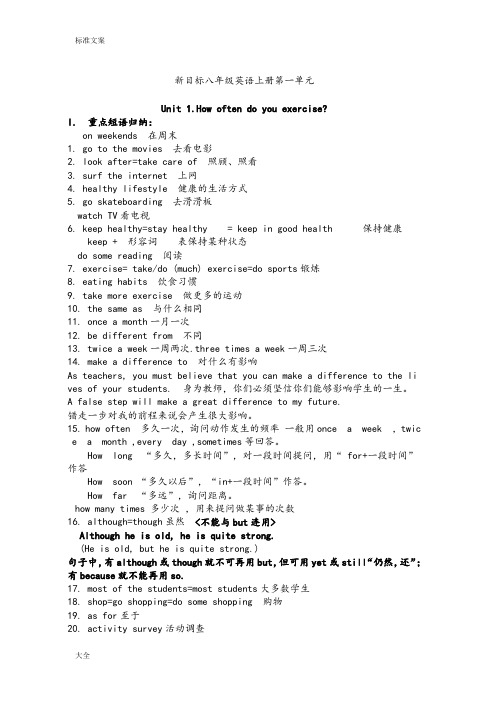
新目标八年级英语上册第一单元Unit 1.How often do you exercise?I. 重点短语归纳:on weekends 在周末1. go to the movies 去看电影2. look after=take care of 照顾、照看3. surf the internet 上网4. healthy lifestyle 健康的生活方式5. go skateboarding 去滑滑板watch TV看电视6. keep healthy=stay healthy = keep in good health 保持健康keep + 形容词表保持某种状态do some reading 阅读7. exercise= take/do (much) exercise=do sports锻炼8. eating habits 饮食习惯9. take more exercise 做更多的运动10. the same as 与什么相同11. once a month一月一次12. be different from 不同13. twice a week一周两次.three times a week一周三次14. make a difference to 对什么有影响As teachers, you must believe that you can make a difference to the li ves of your students. 身为教师,你们必须坚信你们能够影响学生的一生。
A false step will make a great difference to my future.错走一步对我的前程来说会产生很大影响。
15.how often 多久一次,询问动作发生的频率一般用once a week ,twice a month ,every day ,sometimes等回答。

人教版新目标英语八年级上册各单元知识点总结梳理归纳汇总新目标八年级上册英语单元知识点归纳Unit1 Where did you go on vacation? 短语归纳1.go on vacation去度假2.stay at home待在家里3.go to the mountains去爬山4.go to the beach去海滩5.visit museums 参观博物馆6.go to summer camp去参加夏令营7.quite a few相当多8.study for tests为测验而学习9.go out出去10.most of the time大部分时间11.have a good time (doing)=have fun (doing) =enjoy oneself玩得高兴12.of course=sure =certainly当然13.feel like给……的感觉;感受到14.go shopping去购物15.in the past在过去16.walk around四处走走17.because of+名词短语:因为because+句子18. a/one bowl of…一碗……19. the next day第二天20.drink tea喝茶21.find out找出;查明22.go on继续23.take photos照相24.something important重要的事25.up and down上上下下e up出来come out 出版发行27.go out with anyone 跟别人出去28.say about 发表对…看法29.rain hard 雨下得大30.too much+不可数名词太多…too many+可数名词复数太多...much too+形容词太…用法:1.buy sth. for sb. / buy sb. sth.为某人买某物2.taste / look/sound/smell good. 尝起来/看起来/听起来/闻起来不错3.nothing…but+动词原形除了……之外什么都没有4.seem+(to be)+ adj. 看起来……5.arrive in+大地点/ arrive at+小地点/get to +地点/reach +地点到达某地6.decide to do sth.决定去做某事7.try doing sth.尝试做某事/ try to do sth.尽力去做某事8.forget doing sth.忘记做过某事/ forget to do sth.忘记做某事9.enjoy doing sth.喜欢做某事10. want to do sth.想去做某事11.start doing sth.开始做某事12.stop doing sth. 停止做某事13.dislike doing sth. 不喜欢做某事14.keep doing sth.继续做某事keep on doing sth 不停做某事15.Why not do. sth.=why don’t you do sth为什么不做……呢?16.so+adj.+that+从句如此……以至于……17.tell sb. (not) to do sth. 告诉某人(不要)做某事18.enough +名词,形容词+enough19.not really .真的没有。
![新目标八年级英语上册知识点总结-新目标[整理]](https://img.taocdn.com/s1/m/ff9d8371168884868762d688.png)
新目标八年级英语上册语法复习1) leave的用法1.“leave+地点”表示“离开某地”。
例如:When did you leave Shanghai?你什么时候离开上海的?2.“leave for+地点”表示“动身去某地”。
例如:Next Friday, Alice is leaving for London.下周五,爱丽斯要去伦敦了。
3.“leave+地点+for+地点”表示“离开某地去某地”。
例如:Why are you leaving Shanghai for Beijing?你为什么要离开上海去北京?2) 情态动词should“应该”学会使用should作为情态动词用,常常表示意外、惊奇、不能理解等,有“竟会”的意思,例如:How should I know? 我怎么知道?Why should you be so late today? 你今天为什么来得这么晚?should有时表示应当做或发生的事,例如:We should help each other.我们应当互相帮助。
我们在使用时要注意以下几点:1.用于表示“应该”或“不应该”的概念。
此时常指长辈教导或责备晚辈。
例如:You should be here with clean hands. 你应该把手洗干净了再来。
2. 用于提出意见劝导别人。
例如:You should go to the doctor if you feel ill.如果你感觉不舒服,你最好去看医生。
3. 用于表示可能性。
should的这一用法是考试中常常出现的考点之一。
例如:We should arrive by supper time. 我们在晚饭前就能到了。
She should be here any moment. 她随时都可能来。
3) What...? 与Which...?1. what 与 which 都是疑问代词,都可以指人或事物,但是what仅用来询问职业。
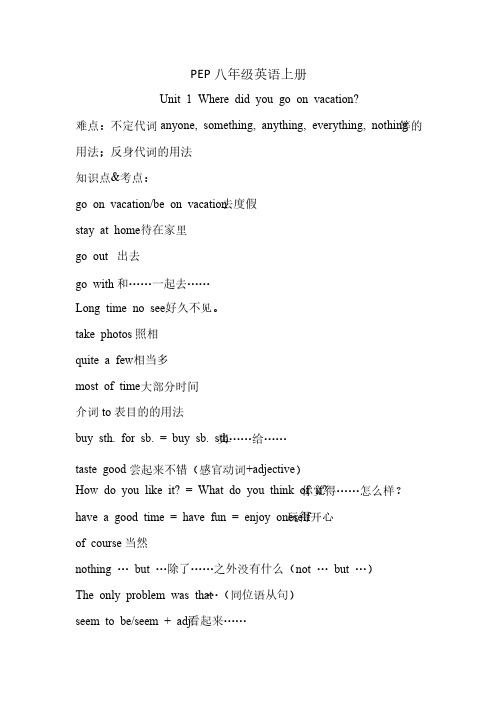
PEP八年级英语上册八年级英语上册Unit 1 Where did you go on vacation? 难点:不定代词anyone, something, anything, everything, nothing等的用法;反身代词的用法用法;反身代词的用法知识点&考点:考点:go on vacation/be on vacation 去度假去度假stay at home 待在家里待在家里待在家里go out 出去出去go with 和……一起去……和……一起去……Long time no see. 好久不见。
好久不见。
take photos 照相照相quite a few 相当多相当多相当多most of time 大部分时间大部分时间大部分时间表目的的用法介词to表目的的用法buy sth. for sb. = buy sb. sth. 买……给……买……给……taste good 尝起来不错(感官动词+adjective)How do you like it? = What do you think of it? 你觉得……怎么样?你觉得……怎么样?have a good time = have fun = enjoy oneself玩得开心玩得开心of course 当然当然nothing …but …除了……之外没有什么(not …but …)…)The only problem was that …(同位语从句)…(同位语从句)seem to be/seem + adj. 看起来……看起来……keep a diary 记日记记日记记日记 + at + 小地点小地点小地点arrive + in + 大地点大地点大地点 decide to do 决定做某事决定做某事决定做某事 try doing sth. 尝试做某事尝试做某事尝试做某事 try to do sth. 尽力做某事尽力做某事feel like 感觉到感觉到 feel like + n./ v-ing 想要……想要……ride … to …骑……到………骑……到……许多的:a lot of + 可数名词可数名词 lots of + 可数可数or 不可数名词不可数名词 I wonder that …我想知道………我想知道………我想知道…… in the past 在过去在过去在过去 enjoy doing sth. 享受做某事享受做某事享受做某事 walk around 到处逛逛到处逛逛感叹句:What + 冠词冠词 + adj. + n. + (it is) = How + adj. + 冠词冠词 + n. + (it is) start start doing doing doing sth. sth. 开始做某事开始做某事 stop stop doing doing doing sth. sth. 停止做某事停止做某事 finish finish doing doing sth. 结束做某事结束做某事because & so (不可同用)(不可同用)(不可同用) wait for …等待………等待……because of + n. a little/ a few 一些(两者的区别,以及与little/few 的区别)的区别) enough + n. / adj. + enough as + adj./adv. + as 和……一样……和……一样……one bowl of …一碗………一碗……along the way 沿着这条路沿着这条路沿着这条路 时间段+ later = after + 时间段……之后时间段……之后other, others, the other, the others, another on trip 在旅途中在旅途中find out 找到,找出找到,找出 / find 寻找寻找 / look for 寻找寻找寻找 so + adj. + that + 从句如此……以致……从句如此……以致……tell sb. (not) to do sth. 告诉某人(不要)做某事告诉某人(不要)做某事keep doing sth. / go on doing sth. 继续做某事继续做某事keep sth. + adj. 使……保持……状态使……保持……状态up and down (人)来来往往;(人)来来往往;(物)上上下下(物)上上下下in excitement = excitedly 兴奋地兴奋地come up / come out / come on / come in forget to do sth. 忘记做某事忘记做某事 forget doing sth. 忘记做过某事忘记做过某事忘记做过某事 like / dislike + n. / v-ing 喜欢/不喜欢某物/做某事做某事something + adj. ……的事情……的事情……的事情 Why not + v. = Why don ’t you + v. 为什么不……呢?为什么不……呢?Unit 2 How often do you exercise? 重点:1. How often 句型的运用;2. 2. 六个频度副词六个频度副词never, hardly ever, sometimes, sometimes, often, often, often, usually, usually, usually, always always 的差异、理解及使用;3. 频率数词once, twice 等的认识和运用;4. 一般现在时不同人称谓语形式的变化及一般疑问句的问答。

人教新目标英语八年级上册unit1-Unit4单元重点知识复习Unit 1: Grammar - "XXX"1.n of Compound Indefinite Pronouns:XXX: something。
everything。
anything。
nothingReferring to People: XXX。
everyone。
anyone。
no one。
XXX。
everybody。
anybody。
nobodyage of Compound Indefinite Pronouns:① anything。
anyone。
anybody are often used in negative XXX。
when anything means "any matter," and anyone。
anybody means "anyone," they are used in affirmative sentences.I don't want to talk to anyone now。
(Negative sentence)Can I ask anyone who knows the answer。
(General n)XXX(Affirmative sentence)What would you like to drink。
Anything is ok。
(Affirmative sentence)② XXX subjects。
the verb must be in singular form.Everyone here is from China.XXX.③ Adjectives XXX.Would you like to buy anything special?Can XXX interesting?④ When making requests。

Unit 1 Where did you go on vacation? 短语:go on vacationstay at homego to the mountains go to the beach visit museumsgo to summer camp quite a fewstudy forgo outmost of the time taste goodhave a good timeof coursefeel like go shoppingin the pastwalk aroundtoo manybecause ofone bowl offind outgo ontake photos something important up and downcome up语法:Where did you go on vacation? I went to New York City.Did you go out with anyone? No, No one was here. Everyone was on vacation. Did you buy anything special? Yes, I bought something for my father.How was the food? Everything tasted really good.Did everyone have a good time? Oh,yes. Everything was excellent.惯用法:1. buy sth for ab./ buy sb. sth 为某人买某物2. taste + adj. 尝起来,,3. nothing ,.but + V.(原形) 除了,,之外什么都没有4. seem + (to be) + adj 看起来5. arrive in + 大地方/ arrive at + 小地方到达某地6. decide to do sth. 决定做某事7. try doing sth. 尝试做某事/ try to do sth. 尽力做某事8. enjoy doing sth. 喜欢做某事9. want to do sth. 想去做某事10. start doing sth. 开始做某事11. stop doing sth. 停止做某事12. look + adj 看起来13. dislike doing sth. 不喜欢做某事14. Why not do sth. 为什么不做,,.呢?15. so + adj + that + 从句如此,,以至于,,16. tell sb. (not) to do sth. 告诉某人(不要)做某事17. keep doing sth. 继续做某事18. forget to do sth. 忘记去做某事/ forget doing sth 忘记做过某事词语辨析:1. anywhere 与somewhere 两者都是不定副词。

人教版新目标八年级英语上册各单元重点单词和短语梳理归纳Unit 1 Where did you go on n?In this unit。
we learn some XXX.1.Phrasesgo on n: XXXstay at home: not go XXXgo to the mountains: XXXgo to the beach: XXXvisit museums: go to museums for sightseeinggo to summer camp: XXXquite a few: a considerable numberstudy for: learn for a specific purposego out: leave the house for activitiesmost of the time: the majority of the timetaste good: have a good flavorhave a good time: enjoy oneselfof course: certainlyfeel like: have the feeling ofgo shopping: visit stores for shoppingin the past: before nowwalk around: stroll in an areabecause of: due toXXX: a serving ofthe next day: the following dayXXX: have tea as a XXXfind out: discovergo on: continuetake photos: use a camera to capture images XXXup and down: moving in different ns come up: appear or XXX2.Sentence Structuresbuy sth。
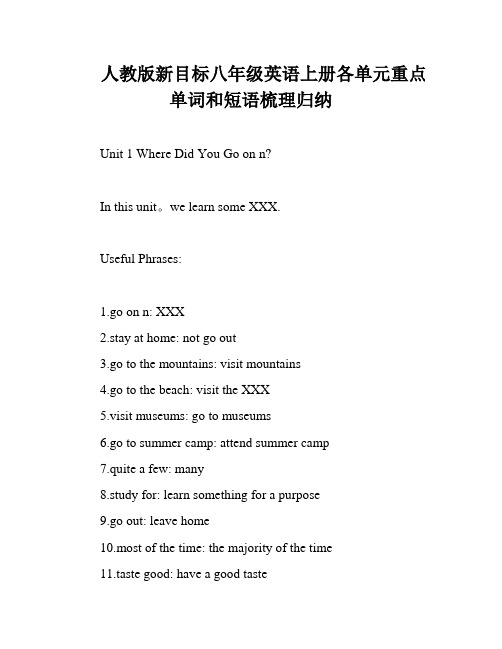
人教版新目标八年级英语上册各单元重点单词和短语梳理归纳Unit 1 Where Did You Go on n?In this unit。
we learn some XXX.Useful Phrases:1.go on n: XXX2.stay at home: not go out3.go to the mountains: visit mountains4.go to the beach: visit the XXX5.visit museums: go to museums6.go to summer camp: attend summer camp7.quite a few: many8.study for: learn something for a purpose9.go out: leave home10.most of the time: the majority of the time11.taste good: have a good taste12.have a good time: enjoy oneself13.of course: certainly14.XXX: have a feeling of15.go shopping: buy XXX16.in the past: in the us time17.walk around: stroll18.because of: due to19.one bowl of: a small bowl of20.the next day: the following day21.XXX: have XXX22.find out: discover23.go on: continue24.take photos: shoot pictures25.something important: something significant26.up and down: moving in different nse up: appearUseful Sentence Structures:1.buy sth。
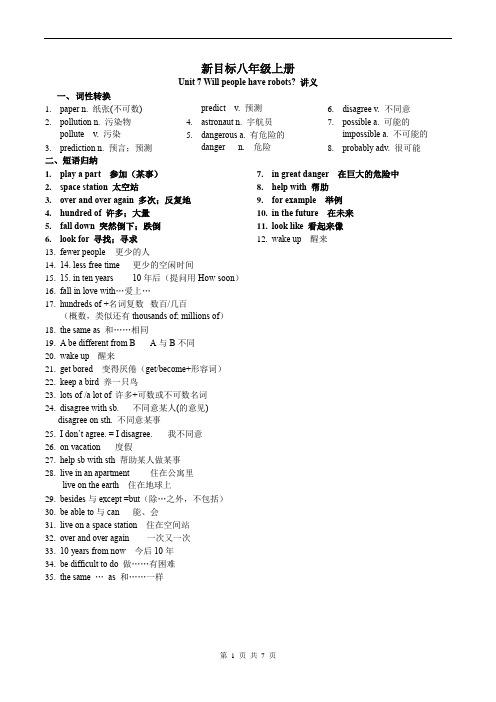
新目标八年级上册Unit 7 Will people have robots? 讲义一、词性转换1.paper n. 纸张(不可数)2.pollution n. 污染物pollute v. 污染3.prediction n. 预言;预测predict v. 预测4.astronaut n. 宇航员5.dangerous a. 有危险的danger n. 危险6.disagree v. 不同意7.possible a. 可能的impossible a. 不可能的8.probably adv. 很可能二、短语归纳1.play a part 参加(某事)2.space station 太空站3.over and over again 多次;反复地4.hundred of 许多;大量5.fall down 突然倒下;跌倒6.look for 寻找;寻求7.in great danger 在巨大的危险中8.help with 帮助9.for example 举例10.in the future 在未来11.look like 看起来像12.wake up 醒来13.fewer people更少的人14.14. less free time更少的空闲时间15.15. in ten years 10年后(提问用How soon)16.fall in love with…爱上…17.hundreds of +名词复数数百/几百(概数,类似还有thousands of; millions of)18.the same as 和……相同19.A be different from B A与B不同20.wake up醒来21.get bored变得厌倦(get/become+形容词)22.keep a bird 养一只鸟23.lots of /a lot of许多+可数或不可数名词24.disagree with sb.不同意某人(的意见)disagree on sth. 不同意某事25.I don’t agree. = I disagree.我不同意26.on vacation度假27.help sb with sth 帮助某人做某事28.live in an apartment住在公寓里live on the earth 住在地球上29.besides与except =but(除…之外,不包括)30.be able to与can 能、会31.live on a space station 住在空间站32.over and over again 一次又一次33.10 years from now 今后10年34.be difficult to do 做……有困难35.the same …as 和……一样三、重难点深度解析1. Do you think there will be robots in people's homes? 你认为将来人们的家里会有机器人吗?Do you think...? 结构通常用来征求对方的意见或看法,后面接宾语从句,从句用陈述语序。

(简化版)人教版新目标八年级上册英语知识点全册人教版新目标八年级上册英语知识点全册(简化版)单元一:School life- 介绍学校的科目、教室和其他相关信息。
- 研究表达时间和日常活动。
- 研究如何询问和回答有关日常活动和时间的问题。
单元二:Hobbies- 研究谈论个人的爱好和兴趣。
- 研究使用动词的-ing形式。
- 研究询问和回答有关爱好的问题。
单元三:At the weekend- 研究谈论周末的活动和计划。
- 研究使用情态动词can和could表达能力和请求。
- 研究询问和回答有关周末计划的问题。
单元四:My town- 研究描述自己所在的城镇或城市。
- 研究使用介词in, on, at描述地点。
- 研究询问和回答有关地点的问题。
单元五:Health and fitness- 研究谈论健康和健身。
- 研究使用情态动词should表达建议。
- 研究询问和回答有关健康和健身的问题。
单元六:Festivals- 研究谈论各种节日和庆祝活动。
- 研究使用一般现在时描述节日活动。
- 研究询问和回答有关节日和庆祝活动的问题。
单元七:Clothes- 研究谈论衣服和购物。
- 研究使用形容词描述衣服。
- 研究询问和回答有关衣服和购物的问题。
单元八:Inventors and inventions- 研究谈论发明家和发明物。
- 研究使用被动语态描述发明物。
- 研究询问和回答有关发明家和发明物的问题。
单元九:Heroes- 研究谈论英雄和英雄的品质。
- 研究使用情态动词may和might表达推测。
- 研究询问和回答有关英雄的问题。
单元十:Customs and traditions- 研究谈论各种俗和传统。
- 研究使用一般过去时描述过去的俗。
- 研究询问和回答有关俗和传统的问题。
单元十一:World records- 研究谈论世界纪录和成就。
- 研究使用比较级和最高级形容词来描述事物。
- 研究询问和回答有关世界纪录和成就的问题。

新目标八年级英语上册第一单元Unit 1.How often do you exercise?I. 重点短语归纳:on weekends 在周末1. go to the movies 去看电影2. look after=take care of 照顾3. surf the internet 上网4. healthy lifestyle 健康的生活方式5. go skateboarding 去滑滑板watch TV看电视6. keep healthy=stay healthy = keep in good health 保持健康keep + 形容词表保持某种状态do some reading 阅读7. exercise= take/do (much) exercise=do sports锻炼8. eating habits 饮食习惯9. take more exercise 做更多的运动10. the same as 与什么相同11. once a month一月一次12. be different from 不同13. twice a week一周两次.three tim es a week一周三次14. make a difference to 对….有影响As teachers, you must believe that you can make a difference to the lives of your students. 身为教师,你们必须坚信你们能够影响学生的一生。
A false step will make a great difference to my future.错走一步对我的前程来说会产生很大影响。
15. how often 多久一次,询问动作发生的频率how many times 多少次,用来提问做某事的次数16. although=though虽然 <不能与but连用>Although he is old, he is quite strong.(He is old, but he is quite strong.)句子中,有although或though就不可再用but,但可用yet或still“仍然,还”;有because就不能再用so.17. as for至于18. activity survey活动调查19. do homework做家庭作业20. do house work 做家务事23. eat less meat吃更少的肉24. junk food垃圾食物25. be good for 对什么有益26. be bad for对什么有害27. want to do sth 想做某事28. want sb to do sth想某人做某事29. try to do sth 尽量做某事30. come home from school放学回家31. of course=certainly=sure当然32. get good grades取得好成绩33. some advice 一些建议some advice 中的advice 是不可数名词 a piece of advice 一则建议give advice 提出建议take one’s advice 采纳或听从某人的建议4. help sb to do sth帮助某人做某事=help sb with sth35. a lot of vegetables=many vegetables许多蔬菜36. hardly= almost not几乎不 hardly ever很少,几乎不,从不37. keep/be in good health保持健康38. your favorite program你最喜欢的节目39. Animal World 动物世界40. play soccer踢足球41.every day 每天every day 与 everyday1. every day 作状语,译为“每一天”。

八年级上册1-6单元知识点总结第一单元一、应掌握的单词:1、exercise既可以做名词,也可以做动词,表示“锻炼,运动”时,是不可数名词,表示“练习,体操”时,是可数名词。
2、skateboard【动词】意为“踩滑板;参加滑板运动”,skate【动词】意为“滑冰;溜冰”,board【名词】意为“板”。
3、hardly=almost not 几乎不几乎不 4、active【形容词】意为“活跃的;积极的”,它的名词形式是activity.5、about=around大约大约 6、of course= sure=certainly当然当然 7、look after=take care of 照顾照顾 8、different【形容词】意为“不同的;有区别的” ,它的名词形式是difference.9、although=though虽然虽然 10、a lot of=lots of后面跟可数名词的复数或不可数名词。
11、must【情态动词】意为“必须”,后面跟动词原形,相当于have to.12、less【形容词】意为“较小的;更小的;较少的;更少的”,它是little的比较级。
的比较级。
二、应掌握的词组:1. go to the movies 去看电影去看电影2. watch TV看电视看电视3. surf the internet 上网上网 ,上网冲浪,上网冲浪 4.read English books读英语书读英语书5.do homework做家庭作业做家庭作业(do housework做家务事)做家务事)6.all students所有的学生100%7.most students大多数学生51-99% (= most of the students)8.some students 一些学生1-50%9.no students没有学生0%10.as for至于至于11. be good for 对什么有益对什么有益(be bad for对什么有害)对什么有害)12. come home from school放学回家放学回家 13. eating habits 饮食习惯饮食习惯饮食习惯14.pretty good非常好,不错非常好,不错15. junk food垃圾食物垃圾食物16. healthy lifestyle 健康的生活方式健康的生活方式健康的生活方式 17.kind of=a little=a little bit有点有点 18. help sb to do sth帮助某人做某事,帮助某人做某事, =help sb with sth 19. go skateboarding 去划板去划板去划板20. keep healthy=stay healthy 保持健康21. exercise=take (much) exercise=do sports锻炼锻炼22. take more exercise 做更多的运动做更多的运动 23. the same as 与什么相同与什么相同24. once a month一月一次一月一次25. be different from 不同不同26. twice a week一周两次一周两次一周两次27. make a difference to 对什么有影响对什么有影响 28. how often 多久一次多久一次多久一次29. shop=go shopping=do some shopping 购物购物30. activity survey活动调查活动调查31. eat less meat吃更少的肉吃更少的肉32. want to do sth 想做某事想做某事33. want sb to do sth想要某人做某事想要某人做某事 34. get good grades取得好成绩取得好成绩取得好成绩35. a lot of vegetables=many vegetables许多蔬菜许多蔬菜36. keep/be in good health保持健康保持健康三、 应掌握的句子:1.How often do you watch TV? 你多久看一次电视?你多久看一次电视?How often + 助动词(助动词(do 或does) + 主语主语 + do sth.?这个句型是用来提问在某一特定这个句型是用来提问在某一特定的时间里进行某个动作的次数,即“多久一次”。

八年级英语上册Unit1知识点【Useful expressions】1.go on vacation 去度假2.go shopping 购物3.go out 外出(娱乐)4.go to summer camp 去夏令营5.go to the beach 去海滩6.go to the mountains 去爬山7.buy sth.for sb.(= buy sb.sth.) 给某人买某物8.keep a diary 记日记9.nothing...but + V.(原形) 除了……之外什么都没有10.seem + (to be) + adj 看起来11.long time no see 好久不见12.most of the time 大多数时间13.study for tests 备考14.feed hens 喂母鸡15.quite a few 相当多;不少16.visit museums 参观博物馆17.visit my uncle 拜访我叔叔18.stay at home 待在家19.taste good 尝起来不错;taste + adj.尝起来……20.in the countryside 在乡下21.along the way 沿途22.another two hours(= two more hours) 另外两个小时23.because of 因为(后接名词代词动名词,because+从句)24.the next day 第二天25.feel like 有……的感觉;感受到,feel doing sth.想要做某事26.decide to do sth.决定做某事27.enjoy doing sth.喜欢做某事28.start doing sth.开始做某事=begin doing sth.29.stop doing sth.停止做某事区分:stop to do sth.停下来去做某事30.dislike doing sth.不喜欢做某事31.try doing sth.尝试做某事 / try to do sth.尽力做某事32.forget to do sth. 忘记去做某事 / forget doing sth 忘记做过某事33.so + adj + that + 从句如此……以至于……34.tell sb.(not) to do sth. 告诉某人(不要)做某事35.find out 查明;弄清e up 升起37.in the past 在过去38.take photos 照相39.too many people太多的人(too many+可数名词复数,too much+不可数名词,much too+形容词或副词)40.walk around 四处走走41.walk up to the top 走到顶部42.arrive in +大地点= get to= reach+地点名“到达......”arrive at +小地点(注:若后跟地点副词here/there/home, 介词需省略,如:arrive here; get home)43.rain hard 雨下得很大=rain heavily44.bring back 带回来45.jump up and down in excitement 兴奋地跳来跳去46.learn something important 学一些重要的东西47.have a fun time 过得很愉快;玩得非常开心48.in the shopping center 在购物中心49.keep doing sth.继续做某事50.go on 继续【Target sentences】1.— Where did you go on vacation?—I went to…2.—Did you…?—Yes, I did./ No, I didn’t.3.Oh, did you go anywhere interesting?4.We took quite a few photos there.5.I just stayed at home most of the time to read and relax.6.It was sunny and hot, so we decided to go to the beach near our hotel.7.I feel like I was a bird.8.What a difference a day makes!9.And because of the bad weather, we couldn’t see anything below.10.I really enjoyed walking around the town.11.We waited over an hour for the train because there were too many people.12.My legs were so tired that I wanted to stop.13.My classmates told me to keep going, so I went on.【Language points】1.Where did you go on vacation?on vacation度假;休假on vacation表示一种状态,其中vacation意为“假期”,与holiday同义。

新目标八年级上册英语语法知识点精讲+练习(一)一般将来时一般将来时表示将来某个时间要发生的动作或者存在的状态。
通常与表示将来的时间状语连用,如tomorrow, the day after tomorrow, n ext year, n ext mon th, n ext week, in 100 years 等。
be goi ng to do (动词原形)结构:表示打算、准备做的事情或者肯定要发生的事情。
如:It is goi ng to rain.will do结构表示将来的用法:1. 表示预见Do you think it will rain?You will feel better after a good rest.2. 表示意图I will borrow a book from our school library tomorrow.What will she do tomorrow?基本构成如下:一般疑问句构成:(1)will+ 主语+do …? Will Sarah come to visit me n ext Sun day?(2)there be 结构的一般疑问句:Will there + be …?Will there be fewer trees? Yes, there will. / No, there won 't否定句构成:will + n ot (wo n')t +doSarah won ' t come to visit me next Sun day.特殊疑问句构成:特殊疑问词+ will +主语+…?What will Sarah do next Su nday?★★练一练★★根据例句,用will改写下列各句例: I don ' t feel well today.(be better tomorrow )I ' II be better tomorrow1. Gina has six classes today. (have a lot of homework tonight )2. I ' m tired now( sleep later)3. My pare nts n eed a new car. (buy one soon)4. We can ' t leave right now. leave a little later)5. The weather is awful today. (be better tomorrow )答案:1. She ' ll have a lot of homework tonight.2. I ' ll sleep later.3. They ' ll buy one soon.4. We ' ll leave a little later.5. Maybe it ' ll be better tomorrow.(二)should 的用法:should用来提出建议和忠告,后边加动词原形,否定句直接在should后边加not.例如:I think you should eat less junk food.我认为你应该少吃垃圾食品。
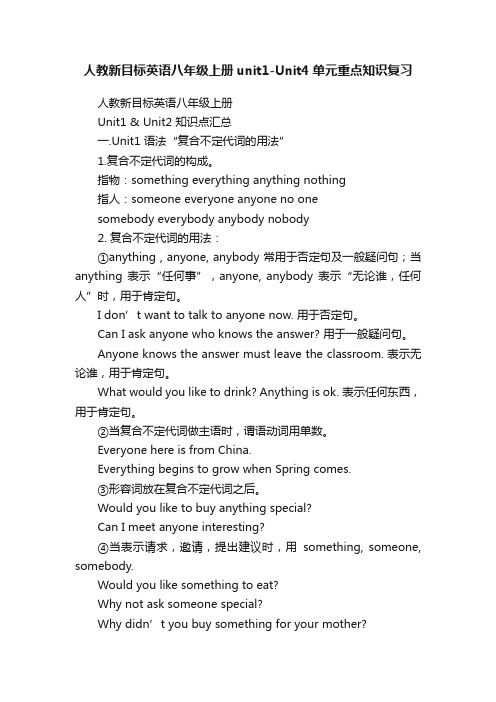
人教新目标英语八年级上册unit1-Unit4单元重点知识复习人教新目标英语八年级上册Unit1 & Unit2 知识点汇总一.Unit1 语法“复合不定代词的用法”1.复合不定代词的构成。
指物:something everything anything nothing指人:someone everyone anyone no onesomebody everybody anybody nobody2. 复合不定代词的用法:①anything , anyone, anybody 常用于否定句及一般疑问句;当anything 表示“任何事”,anyone, anybody 表示“无论谁,任何人”时,用于肯定句。
I don’t want to talk to anyone now. 用于否定句。
Can I ask anyone who knows the answer? 用于一般疑问句。
Anyone knows the answer must leave the classroom. 表示无论谁,用于肯定句。
What would you like to drink? Anything is ok. 表示任何东西,用于肯定句。
②当复合不定代词做主语时,谓语动词用单数。
Everyone here is from China.Everything begins to grow when Spring comes.③形容词放在复合不定代词之后。
Would you like to buy anything special?Can I meet anyone interesting?④当表示请求,邀请,提出建议时,用something, someone, somebody.Would you like something to eat?Why not ask someone special?Why didn’t you buy something for your mother?Unit2 语法“频率副词”How often 常用于对频率的提问,意为“多长时间一次”,其答语可以是once/ twice / three times a week; always/ usually/ often/ sometimes/ hardly ever/ never 等表示时间频率的副词及短语。

新目标八年级上册Unit 9 Can you come to my party? 讲义一、短语归纳1.on Saturday afternoon在周六下午2.prepare for为……做准备3.go to the doctor去看医生4.have the flu患感冒5.help my parents帮助我的父母e to the party来参加聚会7.another time其他时间st fall去年秋天9.go to the party去聚会10.hang out常去某处;泡在某处11.the day after tomorrow后天12.the day before yesterday前天13.have a piano lesson上钢琴课14.look after照看;照顾15.accept an invitation接受邀请16.turn down an invitation拒绝邀请17.take a trip去旅行18.at the end of this month这个月末19.look forward to盼望;期待20.the opening of………的开幕式/落成典礼21.reply in writing书面回复22.go to the concert去听音乐会23.not…until直到……才24.meet my friend会见我的朋友25.visit grandparents拜访祖父母26.study for a test为考试学习27.have to不得不28.too much homework太多作业29.do homework做家庭作业30.go to the movies去看电影31.after school放学后32.on the weekend在周末二、句型荟萃1. invite sb. to do sth. 邀请某人做某事2. what引导的感叹句结构:What+a/an+adj.+可数名词单数(+主语+谓语)!3. What+adj.+名词复数/不可数名词(+主语+谓语)!4. help sb.(to)do sth.帮助某人做某事5. be sad to do sth.做某事很悲伤6. see sb. do sth. see sb.doing sth.7. the best way to do sth.做某事最好的方式8. have a surprise party for sb.为某人举办一个惊喜派对9. look forward to doing sth.期盼做某事10. reply to sth./sb.答复某事/某人11. What’s today?今天是什么日子?What’s the date today? What day is it today?三、重难点知识讲解1. Can you come to my party on Saturday afternoon?in:用在上午下午晚上,在月份、季节和年之前;on用在星期、日期、节日和特定的某一天前。
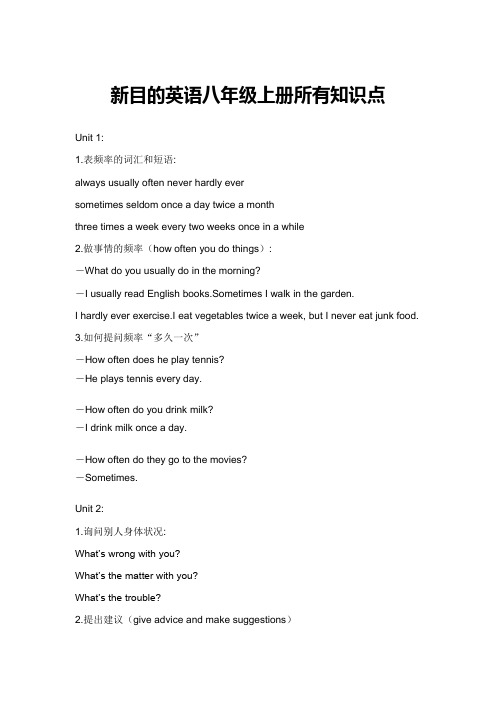
新目的英语八年级上册所有知识点Unit 1:1.表频率的词汇和短语:always usually often never hardly eversometimes seldom once a day twice a monththree times a week every two weeks once in a while2.做事情的频率(how often you do things):-What do you usually do in the morning?-I usually read English books.Sometimes I walk in the garden.I hardly ever exercise.I eat vegetables twice a week, but I never eat junk food.3.如何提问频率“多久一次”-How often does he play tennis?-He plays tennis every day.-How often do you drink milk?-I drink milk once a day.-How often do they go to the movies?-Sometimes.Unit 2:1.询问别人身体状况:What’s wrong with you?What’s the matter with you?What’s the trouble?2.提出建议(give advice and make suggestions)-What’s wrong with you?-I have a headache.-You should go to bed and have a rest.You shouldn’t work late.-I have a fever.-You should drink a lot of water.You shouldn’t be stressed out.Unit 3:一般将来时:1.现在进行时“be+动词ing”可以用来表达一个在最近按计划或安排要进行的动作。
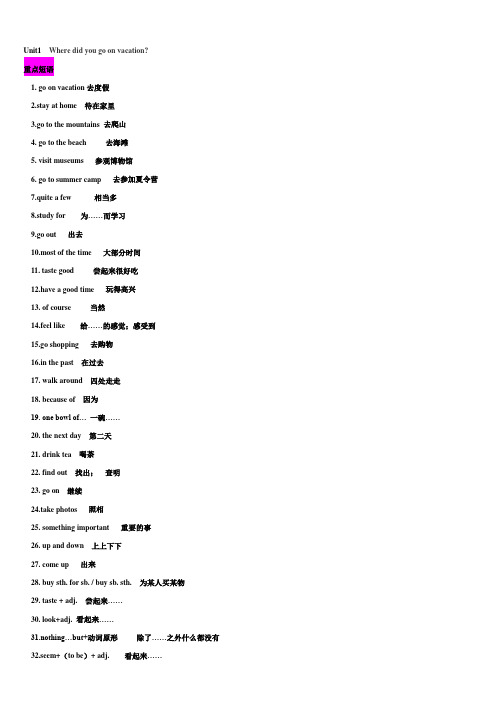
Unit1 Where did you go on vacation?重点短语1. go on vacation去度假2.stay at home 待在家里3.go to the mountains 去爬山4. go to the beach 去海滩5. visit museums 参观博物馆6. go to summer camp 去参加夏令营7.quite a few 相当多8.study for 为……而学习9.go out 出去10.most of the time 大部分时间11. taste good 尝起来很好吃12.have a good time 玩得高兴13. of course 当然14.feel like 给……的感觉;感受到15.go shopping 去购物16.in the past 在过去17. walk around 四处走走18. because of 因为19. one bowl of… 一碗……20. the next day 第二天21. drink tea 喝茶22. find out 找出;查明23. go on 继续24.take photos 照相25. something important 重要的事26. up and down 上上下下27. come up 出来28. buy sth. for sb. / buy sb. sth. 为某人买某物29. taste + adj. 尝起来……30. look+adj. 看起来……31.nothing…but+动词原形除了……之外什么都没有32.seem+(to be)+ adj. 看起来……33. arrive in+大地点/ arrive at+小地点到达某地34.decide to do sth. 决定去做某事35. try doing sth. 尝试做某事/36. try to do sth. 尽力去做某事37. forget doing sth. 忘记做过某事/38. forget to do sth. 忘记做某事39. enjoy doing sth. 喜欢做某事40. want to do sth. 想去做某事41. start doing sth. 开始做某事42. stop doing sth. 停止做某事43. dislike doing sth.不喜欢做某事44. keep doing sth. 继续做某事45. Why not do. sth.? 为什么不做……呢?46. so+adj.+that+从句如此……以至于……47. tell sb. (not) to do sth. 告诉某人(不要)做某事48 .have a good time=enjoy oneself=have fun(doing sth.)玩得痛快三、重点句子:1. Where did you go on vacation? 你去哪儿度假的?2. Long time no see. 好久不见。
新版新目标英语八年级上册知识点总结Unit7 Will people have robortsSection A1.一般将来时(1)概念: 一般将来时是表示将来某个时间将要发生的动作或存在的状态。
I am going to / shall watch a football match on TV this evening. 今天晚上我将看一场足球比赛。
(2)结构①肯定式:主语 + 助动词will/shall + 动词原形 + 其他(wil用于各种人称,shall用于第一人称)=主语 + be going to + 动词原形 + 其他will表示单纯将来概念,be going to强调事先经过考虑安排而计划或打算要做某事(意图) Are you going to post that letter由某种迹象判断某事有可能发生(预见) It’s going to rain.②否定式:在will/shall/be 后面加 not. will not = won’t③一般疑问句:将will/shall/be 提到主语前面。
be 某地有某物它有不同时态。
(1) 过去时态:There was/ were…. 表某地过去有某物(2) 现在时态:There is/ are …. 表某地现在有某物(3) 将来时态:There will be …= There is/are going to be…表某地将有某物(4)句式①一般疑问句形式:Will there be + 主语 + 其他。
②肯定回答:Yes, there will. 否定回答是:No, there won’t.③否定形式:There won’t be + 主语 + 其他,将不会有……④特殊疑问句: 疑问词/ 词组 + 一般疑问句When will there be a nice match何时会有一场精彩的球赛(6) there be句型中不能用have\has(7) there be 表示某地存在某物强调的是客观存在着的东西。
have/has 表示某人有某物,强调所属关系。
主观上拥有某物。
二者有时候可以互换(8)There be 句型中的动词be 应该遵守就近原则。
every 但二者含义及语法功能不同(1) each adj pron adv 在句中作定语,主语、宾语、同位语、状语等Each student has his own dictionary.(adj,定语)Each has his good point . (pron,主语)Our headteacher had a talk with each of us . (pron,宾语)The students each have a desk . (pron,同位语,不影响谓语动词的单复数)The children can have a bag each . (adv,状语)(2)each与every都可用作adj,在句中作定语每一个each 指两个或两个以上的人或事物中的“每个”, 强调个人或个别every是指许多人或事物的全体(三者或者三者以上),与all意思相近, 强调全体或全部, 不能单独使用I know each member of your family . 我认识你们家的每个成员。
I know every member of your family . 我认识你们家的每个成员。
(3)each 单独作主语或each、every修饰的单数名词作主语时,谓语动词为单数形式,但each of them作主语时,谓语动词用单数或复数形式都可以。
Each / Each person / Every person is living a happy life now . 人人都过着幸福生活。
Each of them are / is wearing full dress . 他们个个都身着盛装。
(4)every可与not连用构成部分否定,并不/非人人each不可以与not连用。
全部否定是no one,个个都不、没有人等Each / Everyone / Every one of them doesn’t like the TV play . 并非人人都喜欢电视剧部分否定No one likes the TV play . 完全否定(5)表示每隔……、每……,要用every+基数词+复数名词。
every不能用each替代。
They’ll choose one out of every ten girls . We hand in our homework every three days .4. after与in的用法区别in +时间段与将来时连用以现在的时间为起点,多久之后in +时间短语一般用how soon提问,要过多久以后,要到什么时候after +时间段与过去时连用以过去或将来某个时间为起点,将过多久after +时间点可与将来时连用 He will be back after two o'clock.He will be back in two hours. He came back after two hours.5.(1) fewer 更少的 few的比较级,修饰可数名词复数(2) less 更少的 little的比较级,修饰不可数名词(3) more 更多的 many much的比较级,修饰复数/不可数名词6. pollution n. 污染,污染物(不可数名词) air pollution空气污染 noise pollution pollute v. (使)污染 pollute the sea polluted adj. 被污染的 polluted water被污染的水7. What will the future be like 未来将会是什么样子What’s sb… like 某人怎么样(询问相貌性格品质)be like 像(多方面像) ook like 看上去像(外表方面像)8. in danger 处于危险之中 out of danger 脱离危险9. 主语为人的有spend和pay;主语为物的有cost;主语常为“it”的有take.(1) spend表“某人花费时间或金钱做某事/在某事上”,用于:Sb spend some money/ time (in) doing sth. 或Sb spend some money/ time on sth(2) pay常表“某人花钱买某物”。
用于:Sb. pay some money for sth.(3) cost 常表“某物花费某人某些钱”,用于:Sth. cost sb. some money.(4) take尤指“做某事花费某人某些时间”, 常用于:It takes sb some time to do sth10.on the earth在地球上地点状语句首句尾on earth 究竟,到底用于疑问代词或副词后,加强语气Section B1. human 人,人类,有别于动物,自然景物,机器等特殊群体;也可指具体的人。
He was the only human on the island. 他是岛上唯一的人类。
person 无性别之分,常用于数目不太大而且数目比较确定的场合three personspeople 泛指人们,表示复数概念。
many peopleman前不带冠词而且单独使用时,指男人,a man 可指一个人/ 一个男人,复数形式为men.Man is stronger than woman.2. help (sb) with sth. 在某方面帮助某人3. There is/ are sb. doing sth. 某地有某人/某物正在做某事There are already robots in factories. (work )有机器人正在工厂工作。
There are several factories waste water into the river. (pour)4. do simple jobs over and over again 反复地做一些简单的工作5. get bored 变厌倦( + ed描述人; +ing描述事物)Fewer people will do such jobs in the future because they are_________, but robots will never get _________.6. do the same things as we do 跟我们做相同的事情7. be able to do sth. 能做某事经过努力而成功做成某事有人称和数的变化can 没有人称和数的变化现在式和过去式表示请求允许推测能力8. wake up 醒来 wake sb. up 叫醒某人代词必须放在中间9.agree with sb. 同意某人 disagree with sb. 不同意某人数词百 hundreds of 许多大量数百的数以百计的(1)当这类数词前面有具体的数字时, 数词不能用复数形式:three hundred students 三百学生, five thousand五千, a few hundred 几百。
(2)当数词前没有具体数字时, 数词用复数形式,后面接短语, 再加可数名词的复数形式hundreds of students 数百名学生thousand, million与其用法相同11.talk 谈话,对话(1)talk to...跟……谈话(对话)(2) talk of...谈到;谈起 We often talk of you. 我们常常谈到你。
(3)talk about...谈论某人或某事 What are you talking about 你们在谈论什么(4)talk with...同……交谈 He is talking with a friend. 他在和一个朋友谈话。
12. seem v 好像,似乎,看来看似, 连系动词(1) seem + to do sth似乎/看起来/好像做某事He seems to think so. 他似乎认为如此。
(2) It seems/seemed that 看来…… It seems that he is lying. 看来他在撒谎。
(3) seem + n./adj 好像是,似乎是He seems an honest boy. 看上去他像是个诚实的孩子。
He seems a nice man.(4) seem like 好像,似乎It seemed like a good idea at the time.(5) seem to be + 形容词/名词 = seem + 形容词/名词She seems to be happy.= She seems happy=She was very happy.13. during 介词在....期间during 某事是在某一段时间之间发生for 某事持续多久则in 某事具体发生的时间14. probably ad. maybe 相当于 perhaps. 也许,大概,可能作状语.probably 句中,可能性最大 He will probably come tomorrow.maybe/perhaps 句首 Maybe/Perhaps you are right.。